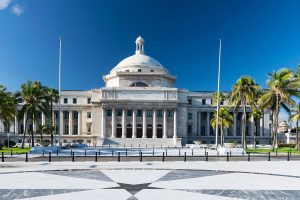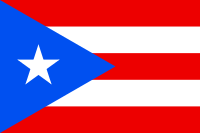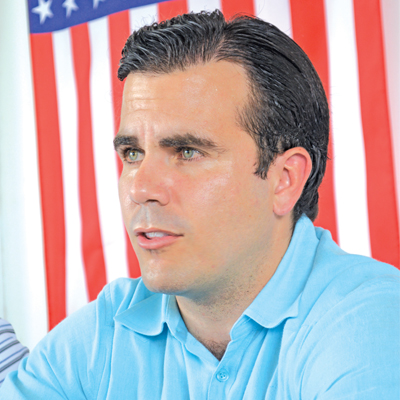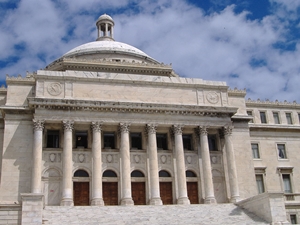July 25, 2019 •
Rosello to Resign
Just days after vowing to complete his term, Gov. Ricardo Rosello announced he will resign on August 2. Rosello, who already was weathering accusations of embezzlement, faced widespread protests this month when the Center for Investigative Journalism published over 800 […]
Just days after vowing to complete his term, Gov. Ricardo Rosello announced he will resign on August 2.
Rosello, who already was weathering accusations of embezzlement, faced widespread protests this month when the Center for Investigative Journalism published over 800 pages from a leaked private group chat.
In the chat, Rosello used derogatory slurs about stateside politicians and institutions, joked about assassinating a political opponent, and made light of the death toll from Hurricane Maria.
Wanda Vazquez, a fellow New Progressive and the current secretary of justice, will take the governorship when Rosello leaves office.
July 23, 2019 •
Protestors Demand Governor’s Resignation
Tens of thousands of protesters marched in San Juan during a territory-wide strike to call for the resignation of Governor Ricardo Rosello. Rosello was already facing accusations of embezzlement when the Center for Investigative Journalism published over 800 pages from […]
Tens of thousands of protesters marched in San Juan during a territory-wide strike to call for the resignation of Governor Ricardo Rosello.
Rosello was already facing accusations of embezzlement when the Center for Investigative Journalism published over 800 pages from a leaked private group chat where the governor used derogatory slurs about stateside politicians and institutions, joked about assassinating a political opponent, and made light of the death toll from Hurricane Maria.
Rosello, who’s administration has received over $92 billion in federal aid, has resigned from the New Progressive Party and dropped his re-election bid; however, he is vowing to finish his current term in office.
July 5, 2018 •
Puerto Rico Convenes Extraordinary Session
Puerto Rico’s Legislature was called into an extraordinary session July 3, 2018, to reconsider labor protections. Ricardo Rosselló and the fiscal oversight board are pushing for the repeal of the law to make Puerto Rico more attractive to outside investors. […]
 Puerto Rico’s Legislature was called into an extraordinary session July 3, 2018, to reconsider labor protections.
Puerto Rico’s Legislature was called into an extraordinary session July 3, 2018, to reconsider labor protections.
Ricardo Rosselló and the fiscal oversight board are pushing for the repeal of the law to make Puerto Rico more attractive to outside investors.
The session is scheduled to adjourn on July 22, 2018.
June 12, 2017 •
Puerto Ricans Vote on Issue of Statehood
Puerto Ricans went to the polls Sunday to vote on whether Puerto Rico should become America’s 51st state. Voters chose between remaining a commonwealth, becoming a state, or gaining sovereignty with an official affiliation with the United States. Critics viewed […]
 Puerto Ricans went to the polls Sunday to vote on whether Puerto Rico should become America’s 51st state. Voters chose between remaining a commonwealth, becoming a state, or gaining sovereignty with an official affiliation with the United States.
Puerto Ricans went to the polls Sunday to vote on whether Puerto Rico should become America’s 51st state. Voters chose between remaining a commonwealth, becoming a state, or gaining sovereignty with an official affiliation with the United States.
Critics viewed the election as flawed, arguing the ballot language was skewed to favor the pro-statehood New Progressive Party. Ninety-seven percent of ballots cast were in favor of statehood.
However, on an island averaging roughly 80 percent voter turnout, only 23 percent of registered voters participated in Sunday’s election.
Nevertheless, Gov. Ricardo Rosselló plans to take the referendum results to Washington, D.C. and speak with Congress, the White House, and various agencies regarding admitting Puerto Rico to the union.
March 2, 2017 •
Puerto Rican Governor Approve June Referendum
This month, Gov. Ricardo Rosello approved a nonbinding referendum to determine whether Puerto Rico will continue free association or seek statehood or independence. The referendum will be held on June 11, 2017, and will give voters the choice between statehood […]
 This month, Gov. Ricardo Rosello approved a nonbinding referendum to determine whether Puerto Rico will continue free association or seek statehood or independence.
This month, Gov. Ricardo Rosello approved a nonbinding referendum to determine whether Puerto Rico will continue free association or seek statehood or independence.
The referendum will be held on June 11, 2017, and will give voters the choice between statehood and independence/free association. Previous referendums and plebiscites have given independence and free association as separate options, but the upcoming referendum lumps them together.
If a majority chooses independence/free association, a second referendum will be held in October to determine the preference between those options. If the referendum passes in favor of statehood, Puerto Rico, currently facing $70 billion in public debt, would have access to more federal funding if ultimately approved by the U.S. Congress as the 51st state.
Currently, Puerto Ricans are U.S. citizens but cannot vote in presidential elections and have limited representation in Congress.
November 9, 2016 •
Ricardo Rosselló Wins Puerto Rico Governor Race
New Progressive Party president Ricardo Roselló defeated David Brenier and two independent candidates for Puerto Rico’s highly contested gubernatorial seat. Rosselló, a college professor and scientist, ran on a platform supporting Puerto Rican statehood and pushing new ideas for economic […]
 New Progressive Party president Ricardo Roselló defeated David Brenier and two independent candidates for Puerto Rico’s highly contested gubernatorial seat. Rosselló, a college professor and scientist, ran on a platform supporting Puerto Rican statehood and pushing new ideas for economic recovery. He is the son of former Puerto Rican Governor Pedro Rosselló who also fought for statehood while in office from 1993-2001.
New Progressive Party president Ricardo Roselló defeated David Brenier and two independent candidates for Puerto Rico’s highly contested gubernatorial seat. Rosselló, a college professor and scientist, ran on a platform supporting Puerto Rican statehood and pushing new ideas for economic recovery. He is the son of former Puerto Rican Governor Pedro Rosselló who also fought for statehood while in office from 1993-2001.
Puerto Rico, a commonwealth, does not have the right to vote in U.S. presidential elections nor do they have legislative representatives in the Senate.
Rosselló plans to hold elections for senators and representatives who will then go to Washington and demand statehood. This model was first followed by Tennessee who created a state constitution and presented it to Congress as a request to join the Union in 1796.
Photo of Ricardo Roselló by Edgardo Colon on Wikimedia Commons.
November 24, 2014 •
Puerto Rico Begins Special Legislative Session
Legislators will meet beginning Monday, November 24, 2014 in a special session. Gov. Alejandro Garcia Padilla called a special session to debate an increase in an oil tax in an attempt to bolster the financial standing of the Highway and […]
 Legislators will meet beginning Monday, November 24, 2014 in a special session.
Legislators will meet beginning Monday, November 24, 2014 in a special session.
Gov. Alejandro Garcia Padilla called a special session to debate an increase in an oil tax in an attempt to bolster the financial standing of the Highway and Transportation Authority.
Photo of the Capitol of Puerto Rico courtesy of Mtmelendez on Wikimedia Commons.
April 3, 2014 •
Puerto Rico Maintains Aggregate Limits Despite McCutcheon
On April 3, the Puerto Rico Office of the Electoral Comptroller issued an informational newsletter in light of the U.S. Supreme Court ruling in McCutcheon v. FEC. In McCutcheon, the Court held federal aggregate campaign contribution limits unconstitutional on First […]

On April 3, the Puerto Rico Office of the Electoral Comptroller issued an informational newsletter in light of the U.S. Supreme Court ruling in McCutcheon v. FEC. In McCutcheon, the Court held federal aggregate campaign contribution limits unconstitutional on First Amendment grounds, as they do not further the permissible government interest in preventing corruption or the appearance of corruption.
While the Court referenced similar aggregate limits in other states and jurisdictions, it did not go so far as to declare them unconstitutional. Therefore, the office is not taking any immediate action with regard to the Puerto Rico aggregate campaign finance limits established in 2011. It will request an opinion from the Puerto Rico Secretary of Justice to determine how the Court’s decision relates to Puerto Rico law.
The office will issue new informational bulletins as further developments arise.
Here is your chance to “Ask the Experts” at State and Federal Communications, Inc.

Q. I am interested in making a political contribution in Puerto Rico. What are the current political contribution limits? Am I required to disclose my contribution?
A. In Puerto Rico, individuals and PACs may make contributions. Direct corporate contributions are prohibited. Puerto Rico has recently raised the annual political contribution limits. In response to the Federal Election Commission raising the federal contributions limits in 2 U.S.C. §441a(a)(1)(A), the Oficina del Contralor Electoral (OCE) issued Circulated Letter OCE-CC-2013-02. The circulated letter raises the individual and PAC contribution limits to $2,600 per candidate per year, with an aggregate contribution limit of $13,000. In an election year, the limits are modified to $2,600 per candidate per election, and $13,000 in the aggregate per election. These contribution limits do not apply to independent expenditures.
There are no reporting requirements for individuals making contributions in Puerto Rico. PACs, however, have a quarterly disclosure requirement for any quarter in which contributions were received or expenditures were made. PACs established and registered in a jurisdiction other than Puerto Rico have separate reporting requirements under the campaign finance regulations issued by the OCE.
For specific guidance on making contributions in Puerto Rico, please contact Sarah Kovit.
You can directly submit questions for this feature, and we will select those most appropriate and answer them here. Send your questions to: marketing@stateandfed.com.
(We are always available to answer questions from clients that are specific to your needs, and we encourage you to continue to call or e-mail us with questions about your particular company or organization. As always, we will confidentially and directly provide answers or information you need.) Our replies to your questions are not legal advice. Instead, these replies represent our analysis of laws, rules, and regulations.
October 22, 2012 •
Appellate Court Enjoins Puerto Rico Campaign Finance Provisions
Law 222
 The United States Court of Appeals for the First Circuit on October 19, 2012 ordered the district court to enjoin Puerto Rico from enforcing provisions of Law 222, a campaign finance law passed in 2011. The provisions in question required corporations and unions to establish separate committees in order to make independent expenditures.
The United States Court of Appeals for the First Circuit on October 19, 2012 ordered the district court to enjoin Puerto Rico from enforcing provisions of Law 222, a campaign finance law passed in 2011. The provisions in question required corporations and unions to establish separate committees in order to make independent expenditures.
Such committees were required to hold membership meetings and vote to approve expenditures related to elections. The court found those provisions were likely to be held unconstitutional regulations of political speech.
Coat of Arms of Puerto Rico courtesy of Creative Commons on Wikipedia.
June 6, 2012 •
Puerto Rico Amends Campaign Finance Provisions
Registration and Reporting Requirements Affected

Puerto Rico has continued its efforts to modernize and improve its campaign finance provisions by passing Project of the Senate 2674-2012. This project amends the Law for the Control of Financing of Political Campaign in Puerto Rico. This project has been referred to the Special Commission on Government Reform, and while not currently law, the Elections Commission has been working to update the campaign finance reporting requirements to reflect the project.
The project has several important elements. First, it elaborates on the definition of a coordinated expenditure by carving out a definition for specific expenditures made for the benefit of a party or candidate. Second, it modifies the campaign finance reporting dates for the 2012 general election. Lastly, the project addresses concerns with respect to state and federal PAC registration and reporting for entities wishing to participate in the electoral process without registering a PAC in Puerto Rico.
We will continue to track this project and provide updates as they become available.
June 1, 2012 •
Do You Have Compliance Questions about Puerto Rico?
State and Federal Communications has your answers!

Sarah Kovit is a Compliance Associate at State and Federal Communications who is a fluent Spanish speaker and who has experience working with Puerto Rican officials and tracking newly enacted legislation. She is here to assist you with your Puerto Rican compliance needs.
According to Kovit: “Navigating the lobbying, political contribution, and procurement lobbying laws in Puerto Rico can be tricky. English copies of newly enacted legislation are rarely available and English language assistance with your questions is not always available. In the last year alone, Puerto Rico has passed a new election code, updated the PAC reporting structure, and created a pay to play law which affects organizations conducting business in Puerto Rico.”
You can contact Sarah Kovit at skovit@stateandfed.com.
February 3, 2012 •
Puerto Rico Updates Campaign Finance Provisions
Puerto Rico has passed the Law for the Control of Financing of Political Campaigns in Puerto Rico. This law is a complete overhaul of all previous campaign finance regulations and includes changes to the PAC reporting requirements, campaign contribution limits, and pay-to-play restrictions.
 The law created new PAC reporting requirements. PACs must file quarterly reports on the 15th day of the month following the end of a calendar quarter. From July 1st of an election year until December 31st of that year, PACs must file monthly reports by the 15th day of the month following the reporting period. From October 1st of an election year until November 30th, reports must be submitted on the 15th and 30th day of each month. A final report covering transactions after the January 1st following the election must be filed 90 days after the election.
The law created new PAC reporting requirements. PACs must file quarterly reports on the 15th day of the month following the end of a calendar quarter. From July 1st of an election year until December 31st of that year, PACs must file monthly reports by the 15th day of the month following the reporting period. From October 1st of an election year until November 30th, reports must be submitted on the 15th and 30th day of each month. A final report covering transactions after the January 1st following the election must be filed 90 days after the election.
Because 2012 is an election year in Puerto Rico, the law makes provisions regarding contribution limits. A contribution of up to $2,500 may be given by a PAC to a candidate between January 1, 2012 and March 18, 2012. An additional contribution of up to $2,500 may be given to each candidate between March 19, 2012 and November 6, 2012. PACs may not give more than $12,500 in the aggregate per election in 2012.
Puerto Rico has also joined the growing list of jurisdictions with pay-to-play laws. Puerto Rico prohibits contributions while a corporation is in the process of obtaining a permit, franchise, or government contract. Once the process of obtaining the permit, franchise, or government contract is completed, a corporation may make a contribution from their PAC. At the municipal level, contributions to local candidates are prohibited if the corporation is seeking a permit, franchise, or contract with the local jurisdiction.
June 13, 2011 •
Puerto Rico Enacts New Election Code
Puerto Rico has enacted the Election Code of Puerto Rico for the 21st Century.

The legislature has indicated that they are currently working on updating the campaign finance provisions which will create the Law for the Financing of Political Campaigns in Puerto Rico.
Photo of the Capitol of Puerto Rico by Mtmelendez on Wikipedia.
State and Federal Communications, Inc. provides research and consulting services for government relations professionals on lobbying laws, procurement lobbying laws, political contribution laws in the United States and Canada. Learn more by visiting stateandfed.com.


